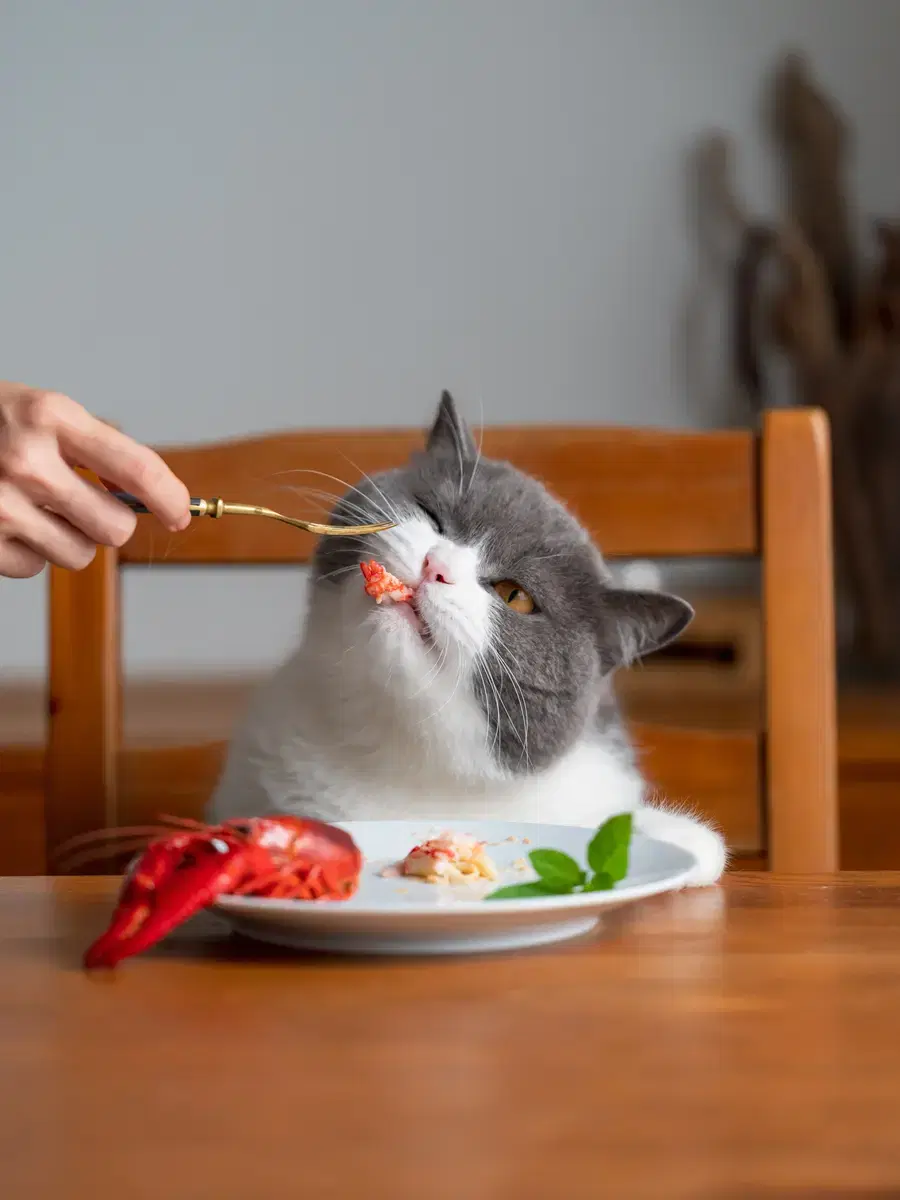Can cats eat Lobster?
Thinking your cat enjoys all seafood just because they adore fish? Are you wondering if sharing is an option? Well, we've got good news for your feline friend - they can safely enjoy a bite! But hold on, a few important things to remember first. Let's dive in!
Do cats like lobster?
Cats generally enjoy a large variety of seafoods, be it shrimp, salmon, or tuna.1 Whether or not you cat will enjoy lobster is impossible to predict. Some cats may love the smell and texture others might just walk away. An important thing to keep in mind is that if you do decide to give your cat a piece of lobster, it should only be given to them as an occasional treat. Lobster should never be a large part of your cat's diet.
Are lobsters good for cats?
While lobster packs a punch of nutrients for humans, it doesn't benefit cats in quite the same way. However, your feline friend can still enjoy a small taste and reap some minor health perks. Lobster boasts an impressive array of vitamins and minerals: vitamin A, B12, and E, alongside calcium, copper, iron, magnesium, omega-3s, phosphorus, selenium, and zinc.2
Health benefits of Lobster for cats
Though not essential for cats like for humans, lobster can offer some minor nutritional benefits if given as an occasional treat. A few of these health benefits of lobster to cats can include1 -
Protein Content: While lobster offers protein important for cat health, it lacks sufficient taurine, a critical amino acid for cats primarily found in animal skin.
Vitamins and Minerals: Lobster contains vitamins and minerals, including vitamin B12, vitamin E, zinc, selenium, and copper which are great for your cat, but these serve as an addition to the cat food that makes up a majority of your cat's diet.
Omega-3 Fatty Acids: Omega-3s are important for feline health, found in both lobster and animal sources. But for optimal absorption, cats primarily need animal-based omega-3s. Choose a cat food formulated with their specific needs in mind.
How can you feed lobster to your cat?
If you want to add lobster to your cat's diet, here are a few tips on how to prepare it for them:
Plain and Cooked: Never give your cat raw lobster. Eating raw lobster can lead to food poisoning.3 Cook the lobster without any seasoning, adding spices can lead to digestive issues and additives like garlic or onion are toxic to cats.
Remove the Shell: Remember, lobster shells are choking hazards for cats. To help keep your curious kitty safe make sure any lobster treat is completely free of any shell pieces before serving.
Limit the Quantity: To avoid digestive upset only a limited amount of lobster should be given to cats as the lobster is fatty and can be difficult for them to digest.
Monitor for Reactions: Changes in behavior, vomiting, diarrhea, or signs of allergies should be looked out for once lobster is introduced to them.
Consult with Your Veterinarian: While tempting, consult your veterinarian before offering your cat any human food including lobster. This helps ensure it aligns with their specific dietary requirements and doesn't exacerbate underlying health conditions.
What happens if a cat eats too much lobster?
Here are a few possible side effects cats can experience if they eat too much lobster -
Upset stomach - Cats may experience gas, bloating, and diarrhea if they eat large amounts of lobster. Lobsters are rich and fatty which makes them difficult for cats to digest.
Obesity - Lobsters are high in proteins and calories which can ultimately lead to weight gain and obesity in cats.
Pancreatitis - Overconsumption of lobster can cause excessive intake of fats which can result in inflammation of the pancreas which is painful for the cat.
Allergic reaction - Feeding excessive lobster to cats can also cause an allergic reaction if your cat has a shellfish allergy. It's best to consult your veterinarian and seek guidance.
Can all cats eat lobster?
Lobsters are generally safe for cats if given in moderate quantities, but in some cases, the cat may be allergic to seafood or may have a medical condition that requires avoiding lobsters.3 Some situations where cats should not consume lobster include:
Cats with chronic health conditions - Cats that have chronic health issues like kidney disease or pancreatitis should avoid having fatty foods like lobsters due to their dietary restrictions.
Cats with gastrointestinal issues - Lobster is high in fat and hence cats that are prone to gastrointestinal issues may not be able to digest lobsters without discomfort.
Cats with shellfish allergies - Some cats may have shellfish allergy and can experience skin issues, upset stomach, and respiratory problems if they eat lobster.
Cat with Renal issue - Cats that suffer from kidney disease may not be able to digest food with high protein. It's best to adhere to their diet and avoid lobster.
Conclusion
The bond between cats and seafood can be fun, but prioritizing your cat's health means making informed choices. Choose pet-safe, commercially prepared options specifically designed for their needs. Trust me, your cat will appreciate the love and the responsible gesture even more!

Creative manager by day, pet enthusiast all the time! After 19 years with my dog (hopefully he wins the award for oldest pet in the world), I enjoy spending my days brainstorming tail-wagging content, and sniffing out the latest trends in the pet world.
"What Human Foods Can Cats Eat? " Home Alive Pets, www.blog.homealive.ca, Feb. 02 2024.












